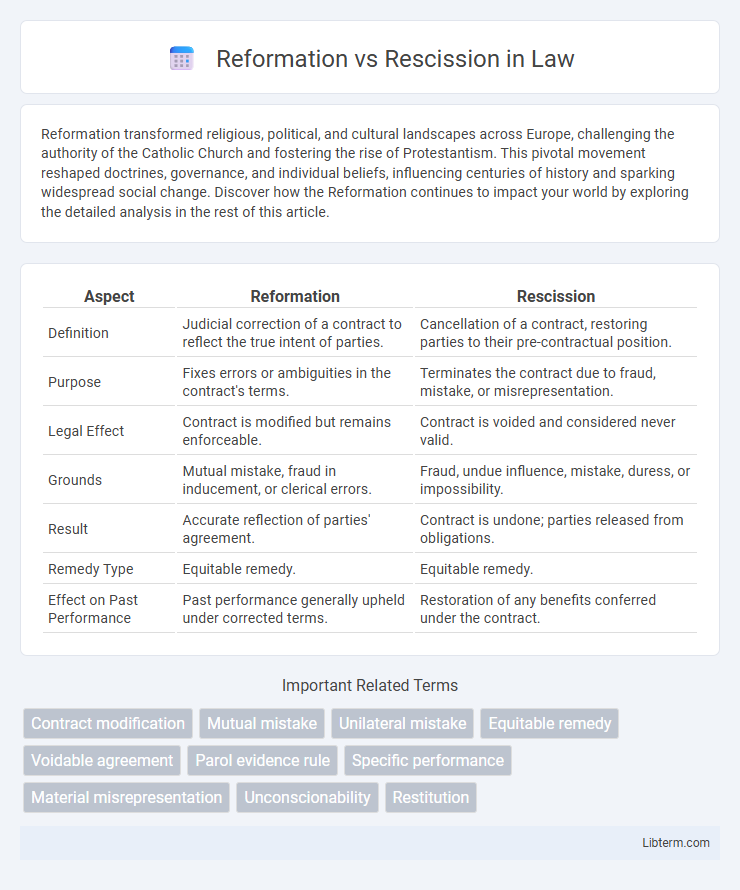Reformation transformed religious, political, and cultural landscapes across Europe, challenging the authority of the Catholic Church and fostering the rise of Protestantism. This pivotal movement reshaped doctrines, governance, and individual beliefs, influencing centuries of history and sparking widespread social change. Discover how the Reformation continues to impact your world by exploring the detailed analysis in the rest of this article.
Table of Comparison
| Aspect | Reformation | Rescission |
|---|---|---|
| Definition | Judicial correction of a contract to reflect the true intent of parties. | Cancellation of a contract, restoring parties to their pre-contractual position. |
| Purpose | Fixes errors or ambiguities in the contract's terms. | Terminates the contract due to fraud, mistake, or misrepresentation. |
| Legal Effect | Contract is modified but remains enforceable. | Contract is voided and considered never valid. |
| Grounds | Mutual mistake, fraud in inducement, or clerical errors. | Fraud, undue influence, mistake, duress, or impossibility. |
| Result | Accurate reflection of parties' agreement. | Contract is undone; parties released from obligations. |
| Remedy Type | Equitable remedy. | Equitable remedy. |
| Effect on Past Performance | Past performance generally upheld under corrected terms. | Restoration of any benefits conferred under the contract. |
Introduction to Reformation and Rescission
Reformation and rescission are two distinct remedies in contract law addressing defects in agreements. Reformation involves the court modifying the terms of a written contract to reflect the true intentions of the parties when there has been a mutual mistake or misrepresentation. Rescission, by contrast, nullifies the contract, restoring parties to their pre-contractual positions when the agreement is invalid due to fraud, mistake, or duress.
Defining Reformation in Contract Law
Reformation in contract law refers to the judicial correction of a written agreement to accurately reflect the true intentions of the parties when the original document contains errors due to fraud, mutual mistake, or misrepresentation. Unlike rescission, which voids the contract and restitutes parties to their pre-contractual position, reformation modifies the contract terms without terminating the agreement. Courts grant reformation only when clear and convincing evidence shows that the written contract deviates from the parties' actual agreement.
Understanding Rescission: Key Concepts
Rescission involves the mutual agreement to undo a contract and restore parties to their original positions, effectively nullifying the agreement from inception. It is often invoked due to factors like fraud, misrepresentation, or mutual mistake that fundamentally impair the contract's validity. Unlike reformation, which modifies contract terms to reflect true intent, rescission entirely terminates the contractual obligation and releases all parties from any future duties.
Legal Grounds for Reformation
Reformation is a legal remedy used to correct mistakes or errors in a contract to reflect the true intentions of the parties involved, typically grounded on evidence of mutual mistake, fraud, or misrepresentation. The legal grounds for reformation require clear and convincing proof that the written agreement does not accurately express the parties' original agreement due to these issues. Unlike rescission, which voids a contract entirely, reformation modifies the document to align with the parties' actual agreement without nullifying the contract itself.
Legal Grounds for Rescission
Rescission is grounded in legal principles such as fraud, misrepresentation, mutual mistake, undue influence, or duress that undermine the validity of a contract. It allows the affected party to void the agreement and restore both parties to their original positions. Unlike reformation, which modifies the contract's terms to reflect the true intent, rescission completely cancels the contract based on these substantive defects.
Procedural Differences: Reformation vs Rescission
Reformation involves court-approved modification of a contract to reflect the true intent of the parties due to mistakes or misrepresentations, typically requiring clear evidence and mutual consent. Rescission, conversely, cancels a contract entirely, restoring parties to their original positions, often triggered by fraud, duress, or mutual mistake. Procedurally, reformation modifies the contract terms while rescission nullifies the agreement, impacting subsequent legal remedies and obligations.
Common Scenarios: When Each Remedy Applies
Reformation typically applies in common scenarios involving mutual mistakes in contracts, such as when written terms do not reflect the original agreement due to drafting errors or misunderstandings. Rescission is often used when contracts are formed under fraud, misrepresentation, undue influence, or mutual mistake, allowing parties to void the agreement and restore them to their pre-contractual positions. Courts prefer reformation for correcting specific contract provisions while rescission is favored for annulling contracts that were never validly formed.
Effects on Contractual Relationships
Reformation modifies the terms of a contract to reflect the true intent of the parties, preserving the contract and maintaining the contractual relationship intact. Rescission cancels the contract entirely, nullifying all obligations and restoring parties to their pre-contractual positions, effectively terminating the contractual relationship. The choice between reformation and rescission significantly impacts the continuity and enforceability of contractual duties and rights.
Case Law Examples: Reformation vs Rescission
Case law examples highlight the distinct applications of reformation and rescission in contract disputes. In *Angel v. Murray*, reformation was applied to correct a mutual mistake regarding contract terms, allowing the contract to reflect the parties' original intent. Conversely, *Laidlaw v. Organ* demonstrated rescission where a contract was voided due to fraudulent misrepresentation, emphasizing the remedy of contract cancellation rather than modification.
Choosing the Right Remedy: Factors to Consider
Choosing between reformation and rescission depends on the nature of the contract defect and the desired outcome. Reformation is ideal when parties seek to correct errors or reflect the true intent without voiding the agreement, often used in cases of mutual mistake or fraud. Rescission suits situations where the contract is fundamentally flawed or induced by misrepresentation, allowing parties to nullify obligations and restore pre-contract conditions.
Reformation Infographic

 libterm.com
libterm.com